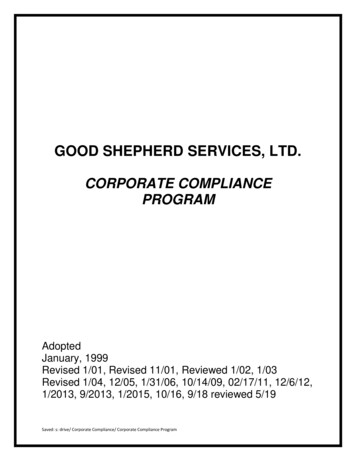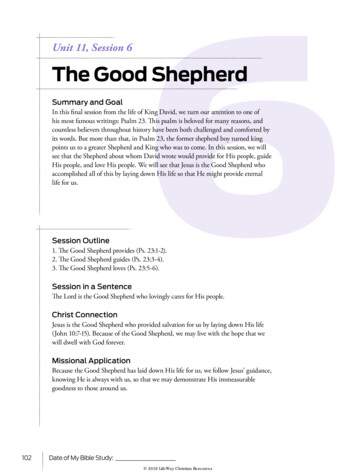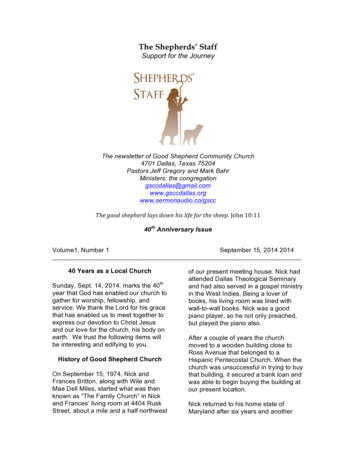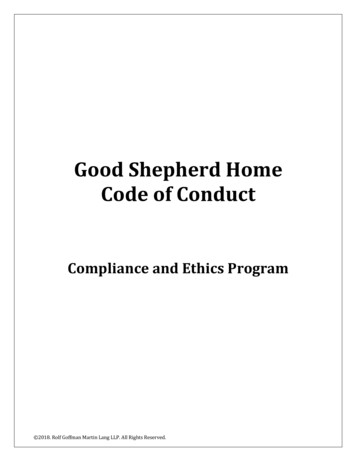
Transcription
GOOD SHEPHERD SERVICES, LTD.CORPORATE COMPLIANCEPROGRAMAdoptedJanuary, 1999Revised 1/01, Revised 11/01, Reviewed 1/02, 1/03Revised 1/04, 12/05, 1/31/06, 10/14/09, 02/17/11, 12/6/12,1/2013, 9/2013, 1/2015, 10/16, 9/18 reviewed 5/19Saved: s: drive/ Corporate Compliance/ Corporate Compliance Program
Purpose of Compliance ProgramThe Board of Directors of Good Shepherd Services has directed the development of aCompliance Program, to reaffirm the commitment of Good Shepherd Services to abideby high legal and ethical standards in connection with the delivery of health care andsocially related services and the future operation of residential facilities for the elderlyand the clients that we serve in all of our programs. The key to upholding thosestandards is through the daily decisions and actions of every Good Shepherd employee.We also require highly ethical conduct from our health care providers, vendors andrelated entities. Each employee and contractor of Good Shepherd is responsible foradhering to the policies and procedures of the Compliance Program.HOW TO REPORT CONCERNS REGARDING COMPLIANCE ISSUESIf a Good Shepherd employee or contractor has concerns regarding any ethics orcompliance issue, including any of the standards of conduct and policies andprocedures described in this Compliance Handbook or the Compliance Section of theEmployee Handbook:That employee or contractor should immediately contact one of the following: His or her administrative supervisor The Good Shepherd Compliance OfficerThe Compliance Officer, Michelle Palubicki can be reached at 920-833-1566 or emailed at mpalubicki@gssltd.org. If you choose to remain anonymous, you areencouraged to provide enough information regarding the potential violation to allowGood Shepherd to review the situation and respond appropriately.You are encouraged to call the Compliance Officer for clarification regarding a possiblecompliance issue, or to report any suspected violation of a Good Shepherd policy or afederal, state or local law or regulation. Please note, however, that the ComplianceOfficer cannot provide you with an opinion regarding your or Good Shepherd’scompliance with any federal, state or local law or regulation. You are advised to seekcounsel from your own legal advisors regarding these matters. The ComplianceOfficer takes your calls very seriously. The information that you give the ComplianceOfficer is documented and investigated. The Compliance Committee works with theCompliance Officer to investigate reports of suspected violation. If the suspectedviolation involves any member of the Corporate Compliance Committee or ComplianceOfficer, that person will not be involved in the investigation. Many calls are referred tointernal departments for investigation depending on the nature of the suspectedviolation. The Good Shepherd Board President and Board members will be notified ofany compliances issues that require their attention. Good Shepherd will seek legalcounsel as needed.Saved: s: drive/ Corporate Compliance/ Corporate Compliance Program
COMPLIANCE OFFICER AND COMMITTEE MEMBERSCompliance Officer:Michelle Palubicki- (920) 833-1566mpalubicki@gssltd.orgCompliance Committee:Deb Captain-Executive Director (920)833-6856 ext. 102dcaptain@gssltd.orgLeah McCarthy-Director of Nursing (920)833-6856 ext. 125lmccarthy@gssltd.orgDawn Gilliam-Director of Business Services (920)833-6856 ext. 137dgilliam@gssltd.orgREPORTING AND INVESTIGATING OF VIOLATIONSReporting of ViolationsIf you become aware of a possible violation of Good Shepherd’s Compliance Programor any related law or policy, you should immediately report it by contacting youradministrative supervisor or the Corporate Compliance Officer. Good Shepherdassumes the responsibility to report Medicare program noncompliance, violations oflaw, criminal misconduct and fraud, waste and abuse to the Centers for Medicare &Medicaid Services (CMS), CMS designee, other regulatory agencies and/or lawenforcements, as applicable, for any violations related to Good Shepherd.No RetaliationGood Shepherd strictly prohibits retaliation against any employee, health care provider,vendor or related entity who, in good faith, reports an actual or possible violation ofethical standards. Your call to the Compliance Officer may be made anonymously.Investigation of ViolationsGood Shepherd shall promptly investigate any reported potential violations of itsCorporate Compliance Program and other policies and procedures. All reported issuesare treated confidentially. You are expected to cooperate fully in any investigation of analleged violation. If you want to remain anonymous, please provide enough informationto allow Good Shepherd to investigate the issue. Good Shepherd employees, healthcare providers, vendors and related entities are expected to report to Good Shepherdupon discovery, any potential violations of Good Shepherd’s Corporate ComplianceProgram or other policies and procedures.Saved: s: drive/ Corporate Compliance/ Corporate Compliance Program
Discipline for ViolationsGood Shepherd employees, contracted health care providers, vendors and relatedentities should do what is permissible, acceptable and expected. That means usingcommon sense, good judgment and proper behavior. Violation of Good Shepherd’sCorporate Compliance Program and other policies and procedures could compromiseGood Shepherd’s integrity and reputation, and may result in termination of employmentof a Good Shepherd employee, termination of business with a contracted health careprovider, vendor or related entity and based on the violation, reporting to the appropriateauthorities. Health care providers, vendors and related entities should take appropriatedisciplinary actions for those employees, representatives and subcontractors found tobe in violation, up to and including termination of contract or employment. All suchactions should be reported to Good Shepherd’s Compliance Officer as referenced inthis document.The following are examples of conduct that can result in termination of contractor employment: Authorization or participation in actions that violates the Corporate ComplianceProgram or other policies. Failure to report a violation of the Corporate Compliance Program or other policies. Refusal to report a violation of the Corporate Compliance Program and other policies. Refusal to cooperate in an investigation of an alleged violation of the CorporateCompliance Program or other policies. Failure to detect and report a violation of the Corporate Compliance Program or otherpolicies, if such failure reflects inadequate supervision or lack of oversight. Retaliation against an individual for reporting or participating in the investigation of aviolation or possible violation of the Corporate Compliance Program or other policies.TYPES OF COMPLIANCE ISSUES TO REPORTAll employees or contractors are expected to report any reasonably suspected or knownviolations of any of the following: Applicable legal requirements. Good Shepherd standards of conduct, policies or procedures contained in theCompliance Program and any attachments. Other compliance policies and procedures which are currently included in the GoodShepherd Policy and Procedure Manual.Saved: s: drive/ Corporate Compliance/ Corporate Compliance Program
. Any employee or contractor who acquires information that gives him or her reason tobelieve that another employee or contractor is engaged in or plans to engage in conductprohibited by the Compliance Program. Any information indicating that any other person or entity associated with GoodShepherd plans to violate the standards of conduct or policies and procedurescontained in the Compliance Program. If he/she is instructed, directed, or requested to engage in conduct prohibited by theCompliance Program.CONFLICTS OF INTERESTAll health care providers, vendors and related entities and their employees,representatives and subcontractors supporting Good Shepherd business are required toavoid conflicts of interest. Good Shepherd associates must not engage in activities thatcompete with any of Good Shepherd’s lines of business. Good Shepherd associatesshould not invest in entities they may select, manage or evaluate as a vendor to GoodShepherd.Health care providers, vendors and related entities must be sensitive to theserelationships and avoid creating situations that encourage a Good Shepherd associateto violate these policies. Health care providers, vendors and related entities shouldnever offer or provide, directly or indirectly, anything of value – including cash, bribes orkickbacks – to any Good Shepherd associate, representative or customer orgovernment official in connection with any Good Shepherd procurement, transaction orbusiness dealing. Such prohibition includes offering or providing consulting,employment or similar position by a health care provider, vendor or related entity to anyGood Shepherd associate involved with a Good Shepherd procurement. This alsoapplies to their family members or significant others.Good Shepherd health care providers, vendors and related entities are required toobtain a conflict of interest statement upon hire and annually thereafter from allemployees and representatives. This statement certifies that the employee orrepresentative is free from any conflict of interest for administering or deliveringMedicare benefits or services. In addition, Good Shepherd reserves the right to obtaincertifications from all providers, vendors and related entities to verify that entity (ies) andtheir employees and representatives are free from conflicts of interest.GIFTS AND ENTERTAINMENTIt is Good Shepherd’s policy that associates cannot give to or accept from health careproviders, vendors or related entities gifts with a value greater than 50 USD. Anynominal gifts or courtesies must be lawful, unsolicited and infrequent. Gifts of money orSaved: s: drive/ Corporate Compliance/ Corporate Compliance Program
cash equivalents are never permissible. The health care provider, vendor or relatedentity should not present gifts to associates of Good Shepherd. A Good Shepherdhealth care provider, vendor or related entity is expected to understand the businessentertainment policies of Good Shepherd before offering or providing any GoodShepherd associate or representative any business entertainment. Businessentertainment should never be offered to a Good Shepherd associate or representativeby a health care provider, vendor or related entity under circumstances that create anappearance of impropriety.ANTI-KICKBACK LAWSFederal anti-kickback laws prohibit people from paying for meals, refreshments, travelor lodging for government employees. Medicare and Medicaid specific laws prohibitknowingly offering, paying, soliciting or receiving remuneration of any kind to induce thereferral of business under a federal program. Federal acquisition regulations state thatno gratuities, in the form of entertainment, gifts or otherwise, or kickbacks shall beoffered or given by a health care provider, vendor or related entity, or anyone acting ona health care provider’s, vendor’s or related entity’s behalf, to any employee of thegovernment or prime contractor of the health care provider, vendor or related entity witha view toward securing favorable treatment. The U.S. Foreign Corrupt Practices Actprohibits U.S. citizens and organizations – including foreign companies of U.S.organizations – from paying foreign officials for the purposes of gaining a businessadvantage. In addition, most states have laws that prohibit kickbacks and rebates.Violators are subject to imprisonment, high fines, and exclusion from Medicare andMedicaid and government contracts, costly civil penalties and possible prosecutionunder many similar state laws.GOOD SHEPHERD DOES NOT PAY FOR REFERRALS Good Shepherd will not pay or accept payment from anyone -- employees, physicians,hospitals, or other health care professionals and providers -- for referrals. Good Shepherd will not make payments or provide non-cash benefits (e.g., officespace, services of support personnel, etc.) to any physician or other health careprofessional in exchange for, or in order to induce, referrals.Guidelines for Appropriate Referrals by Non-Employees and EmployeesPhysicians and other health care professionals who are not employees of GoodShepherd are free to refer residents/patients/clients/children to any person or entity theydeem appropriate, or as requested by the resident/patient/client/child. Whereemployees of Good Shepherd are in a position to make referrals, they must make suchreferrals based on the preferences of the individual seeking treatment, or, if theindividual does not express a preference for a particular provider, what is best for theindividual. In any case, referrals by employees of Good Shepherd must be madewithout regard to the number of referrals any physician or other health care professionalhas made to Good Shepherd.Saved: s: drive/ Corporate Compliance/ Corporate Compliance Program
ANTI-TRUST LAWSState and federal antitrust laws prohibit monopolistic conduct and agreements thatrestrain trade. Good Shepherd is committed to competition and consumer choice in themarketplace. All health care providers, vendors and related entities must adhere to theantitrust laws and must avoid any agreements or understandings with competitors onprice, customers, markets or other terms of dealing, and avoid trade practices thatunfairly or unreasonably restrain competition in dealings with customers.HEALTH INSURANCE PORTABILITY AND ACCOUNTABILITY ACT (HIPAA)OF 1996It is the intention of Good Shepherd to comply with the requirements of HIPAA as theypertain to privacy and confidentiality. All medical records and other individuallyidentifiable health information held or disclosed by Good Shepherd, whethercommunicated electronically, on paper, or orally falls within the protection of thisregulation. All residents/tenants/patients/clients will be provided with a clear writtenexplanation of how they can use, access, keep and disclose their healthinformation. Such information shall include a complaint mechanism. Good Shepherd Services shall not knowingly release health-related informationwithout the voluntary consent of the care recipient or as allowed or required byother statutes. Any release of health information for non-health purposes shall require theexplicit authorization from the individual. All disclosures of information will be limited to the least amount necessary for thepurpose of disclosure unless, as allowed, when the full record is needed toprovide the best quality care or treatment. Good Shepherd has developed and implemented written policies and proceduresdefining who has access to information, how information is used within the entityand when information would or would not be disclosed. Employees will receive the sufficient training on privacy protection procedures. Good Shepherd has designated the Nursing Home Administrator as the PrivacyOfficer to monitor the effectiveness of the program and facility compliance. TheBusiness Services Director/ or designee is appointed as the security officer tomonitor and make recommendations necessary to maintain the integrity of themedical records.Saved: s: drive/ Corporate Compliance/ Corporate Compliance Program
Good Shepherd has instructed and expects that contractors or any businessassociate shall protect the privacy of health information. This has beenaccomplished by providing them with a copy of the compliance plan. Good Shepherd has established a grievance process, providing a means forpatients/residents/tenants/client to make inquiries or complaints regarding theprivacy of their medical record. Good Shepherd will honor requests for electronic copies of PHI, as appropriate.Requests for electronic records will be facilitated by the Business ServicesDirector. Good Shepherd will not use PHI for marketing or fundraising, nor will it sell PHI. All breaches in PHI shall be reported to the Executive Director. All breachincidents must be reported under the HIPAA Omnibus Rule unless risk ofcompromise is low. See DHS/DQA memo 13-019. HIPAA enforcement and penalties shall apply in relation to breaches of PHI.CONTRACTOR OBLIGATIONS UNDER THE HEALTH INSURANCEPORTABILITY AND ACCOUNTABILITY ACT (HIPAA) OF 1996In matters relating to the contractor’s access, possession and use of protectedinformation at GSS, the contractor will: Restrict the use and disclosure of protected health information as permitted by theagreement, HIPAA, state and federal law Use necessary safeguards to prevent unauthorized use or disclosure Report to GSS any unauthorized use, breach or disclosure Extend compliance obligations to subcontractors and agents Make protected health information available upon the request of thepatient/client/tenant/resident or their legally designated agent Upon notification, incorporate changes and additions to protected health information Make its books, records and information practices regarding protected healthinformation available to the Department of Health and Human Services Return or destroy all protected health information upon contract terminationSaved: s: drive/ Corporate Compliance/ Corporate Compliance Program
Authorize termination of the contract for a material breach or release of protectedinformation Agree to the right of GSS to monitor the contractor’s compliance Agree to the right that GSS may cure the breach by the business associate Agree to the right of GSS to seek an injunction (with stipulation to burden of proof) Agree to indemnification for a breach Agree to no cap on liability for breaches Agree to relinquish control to GSS for subpoenas received by the business associate Use data in accordance with applicable lawFALSE CLAIMS ACTThe False Claims Act is a federal statute that deals with any federally funded contract orprogram, including Medicare or Medicaid, regarding fraudulent activities. Liability for anyperson or company who knowingly submits or causes to be submitted a false orfraudulent claim (any request or demand for money) to the U.S. government isdocumented in the False Claims Act.Whistleblower (Qui Tam) Protection – 31 United States CodeService (USC) 3730 (h)The whistleblower provision protects employees who assist the federal government ininvestigation and prosecution of violations of the False Claims Act. Whistleblowerprotections apply only to actions taken in furtherance of a viable False Claims Act case,which has been, or is about to be, filed. The provision prevents retaliation againstemployees such as firing them for assisting in the investigation and prosecution. If anyretaliation does occur, the employee has a right to obtain legal counsel to defend theactions taken.Note: A whistleblower (Qui Tam) is someone, such as an employee, who reportssuspected misconduct that would be considered an action against company policy orfederal laws or regulations.Physician Self-Referral Prohibition Statute commonly referred to as the “StarkLaw” 1877 of the Social Security Act (42 USC 1395)This statute prohibits physicians from referring Medicare patients for certain designatedhealth services (DHS) to an entity with which the physician or a member of thephysician’s immediate family has a financial relationship, unless an exception applies. Italso prohibits an entity from presenting or causing to be presented a bill or claim toSaved: s: drive/ Corporate Compliance/ Corporate Compliance Program
anyone for a DHS furnished as a result of a prohibited referral. For more information,see http://www.cms.hhs.gov/PhysicianSelfReferral on the CMS website.ANTI-MONEY LAUNDERINGGood Shepherd has an anti-money laundering program that is based on assessed risksassociated with Good Shepherd's covered entities. The program is designed toreasonably prevent Good Shepherd from being used by others to facilitate moneylaundering and the financing of terrorist activities involving any covered entity, and toreport suspicious transactions involving any covered entity to the Financial CrimesEnforcement Network (FinCEN). Health care providers, vendors and related entitiesmay not engage in money laundering or finance terrorist activities, and are expected tohave programs to prevent and detect such activities.FAIR MARKET VALUEAny payments to physicians, other health care professionals and providers, or otherindividuals or entities that provide items or services in connection with the delivery ofhealth care services by Good Shepherd must represent the fair market value of specificitems or services provided or rendered pursuant to a written contract that has beenapproved through the Good Shepherd contract approval process.FRAUD, WASTE & ABUSEGood Shepherd has zero tolerance for any activity that constitutes fraud, waste orabuse. The detection, correction and prevention of fraud, waste and abuse is essentialto maintaining a health care system that is affordable for everyone. Both state andfederal law enforcement agencies are increasingly focused on investigating health carefraud, waste and abuse. In 2006, CMS issued the Medicare Fraud, Waste and AbuseGuidance that may be found a/Downloads/PDBManual Chapter9FWA.pdfThe following are definitions of fraud, waste and abuse:Fraud means an intentional deception or misrepresentation made by a person with theknowledge that the deception could result in some unauthorized benefit to him or herselfor some other person. It includes any act that constitutes fraud under applicable federalor state law.Waste means to use up health care benefits or spend health care dollars without realneed. For example, prescribing a medication for 30 days with a refill when it is notknown if the medication will be needed.Saved: s: drive/ Corporate Compliance/ Corporate Compliance Program
Abuse means health care provider practices that are inconsistent with sound fiscal,business or medical practices and result in unnecessary cost to the health care system,or in reimbursement for services that are not medically necessary or that fail to meetprofessionally recognized standards for health care. It also includes beneficiarypractices that result in unnecessary cost to the health care system. Contracted healthcare providers, vendors and related entities are responsible for developing their owncomprehensive plan for detecting, correcting and preventing fraud, waste and abuseQUALITY OF CAREGood Shepherd is a faith-based care campus dedicated to serving those entrusted to uswith dignity, respect and compassion, in a safe and cheerful environment. Our goal is toprovide extraordinary care, while creating moments of joy and a sense of belonging.Good Shepherd Administrative staff are familiar with and support Good Shepherd’scommitment to compliance of 42CFR part 483(part 483) which sets forth the principalrequirements for nursing facility participation in the Medicare and Medicaid programs.Targeted training in the requirements of part 483 is given to care providers, managers,administrative staff, officers and directors of Good Shepherd. Good Shepherd ensuresthat corporation meets the requirements of part 483 and state and federal policies byreviewing survey results, training of staff, reviewing policies and procedures andmonitoring that all staff follow state and federal policies. Good Shepherd schedules staff to comply with state and federal policy and inregard to maintaining the highest practicable physical, mental and psychologicalwell-being of residents. Staffing patterns are assessed regularly to ensure thatthere are sufficient and qualified staff to care for the unique acuity levels of theresidents. In assessing staffing models, schedulers keep in mind resident casemix, staff skill levels, staff-to-resident ratios, staff turnover, staff schedules,disciplinary records, payroll records, timesheets and adverse even reports(e.g.falls or adverse drug events), as well as receiving input from staff, resident’sfamilies or legal guardians. Comprehensive Resident Care Plans are developed for each resident toensure that each resident is receiving necessary medical, nursing and mentaland psychosocial needs. The care plans include reasonable objectives andtimetables. Good Shepherd ensures that all care planning includes all disciplinesinvolved in resident care. Perfunctory meetings and plans are conducted withthe full clinical team. The full interdisciplinary team meets regularly andcompletes all assessments before the meeting is convened. During thesemeetings, there is an exchange of information between the direct care providersand interdisciplinary team members, the resident and the resident’s familymembers or legal guardian. Documentation is kept on the length and content ofthe meeting.Saved: s: drive/ Corporate Compliance/ Corporate Compliance Program
Good Shepherd ensures that a physician supervises each resident’s care. Thephysician is involved in the resident’s care plan through consulting, careplanning, and meeting either in person or via meeting attendance. Good Shepherd follows part 483 regulations in providing pharmaceuticalservices(including procedures that assure accurate acquiring, receiving,dispensing and administering of all drugs and biologicals) to meet the needs ofeach resident. Good Shepherd has a policy and procedure in place formaintaining accurate drug records and tracking medications. All staff involved inpharmaceutical care of residents are trained on a regular basis on propermedication management. A policy and procedure is in place to ensure the propertracking of medications and keeping accurate drug records. Good Shepherdworks closely with the facility’s licensed pharmacist in helping to identify,evaluate and address medication issues. The pharmacist reviews the drugregimen of each resident at least once a month. The pharmacist shall report anyirregularities discovered in a resident’s drug regimen to the attending physicianand the director of nursing. The pharmacist also keeps a record of the receiptand disposition of all controlled drugs. Good Shepherd ensures that psychotropic medications are usedappropriately. Good Shepherd does not use any medication as a means ofchemical restraint for purposes of discipline or convenience and which are notrequired to treat a resident’s medical symptoms. Unless otherwisecontraindicated residents who are prescribed psychotropic medications, receivegradual dose reductions and behavioral interventions aimed at reducingmedication use. Good Shepherd ensures that there is adequate indication for theuse of the medication and monitors, documents and reviews the use of anyresident’s psychotropic drugs. The use of psychotropic drugs is monitored by thephysician, medical director, pharmacist and resident care providers andoutcomes of care reviewed to ensure that the resident’s care plan is beingeffective or if the plan needs to be adjusted to meet the resident’s needs. All residents have the legal right to be free from abuse and neglect. GoodShepherd promotes resident safety through implementing policies andprocedures to prohibit mistreatment, neglect and abuse of residents. Proceduresto report abuse and neglect and the procedures used to investigate a report areoutlined in the Corporate Compliance Policy. Good Shepherd care staff are trained to be aware of and report to theirimmediate supervisor any resident to resident interactions which may beconsidered abusive. In an attempt of avoid resident to resident abuse, GoodShepherd properly screens and assesses residents as part of the admissionprocess. Periodic resident assessments, comprehensive care plans, andadequate staffing assignments are used to monitor and ensure that a safeenvironment is provided for all residents.Saved: s: drive/ Corporate Compliance/ Corporate Compliance Program
Good Shepherd will not hire or maintain employment of any individuals whohave been found guilty of abuse, neglect or mistreatment of residents orindividuals with a finding entered into the State nurse aide registry concerningabuse, neglect, mistreatment of residents or misappropriation of their property.Good Shepherd runs a background check and performs an OIG exclusion checkon all prospective employees. Employees must provide verification of theireducation, licensing certification and training. Good Shepherd requires that all agencies and employees within theorganization follow state and federal regulations and policies which are specificto their department in caring for and interacting with tenants, clients, residents,children and families. There is zero tolerance for abuse, waste and/or neglectwithin any agency that is a part of Good Shepherd.THERAPY SERVICESResidents have the right to receive necessary and appropriate physical, occupationaland speech therapy services. Good Shepherd contracts with a licensed therapycontractor. The therapy contractor provides Good Shepherd with complete andcontemporaneous documentation of each resident’s services; regular and periodicreconciliation of the physician’s orders and the services actually provided; interviewswith the residents and family members and assessments of the continued medicalnecessity for services which are shared during resident care planning meetings.RESTORATIVE AND PERSONAL CARE SERVICESGood Shepherd strives to ensure that residents receive appropriate restorative care andpersonal care services which will allow them to attain and maintain their highest level offunctioning. Personal care services include, but are not limited to: care to avoidpressure ulcers, active and passive range of motion, ambulation, fall prevention,incontinence management, bathing, dressing and grooming activities. Good Shepherdcare staff and interdisciplinary team members ensure compliance to providingrestorative and personal
Good Shepherd associate involved with a Good Shepherd procurement. This also applies to their family members or significant others. Good Shepherd health care providers, vendors and related entities are required to obtain a conflict of interest statement upon hire and annually thereafter from all employees and representatives.










